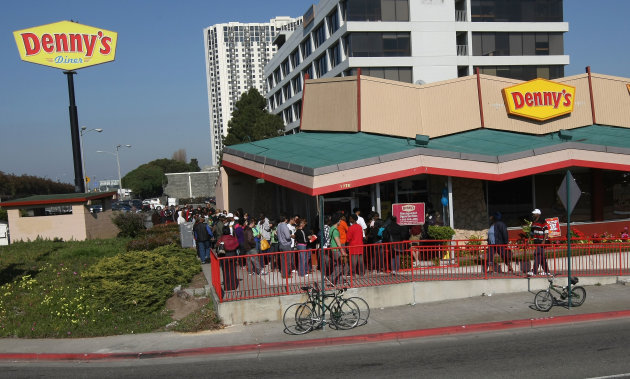A man who owns 40 of the restaurants says he has no choice if he wants to stay in business.
这个餐馆老板说只能这样做了, 因为 ObamaCare 实行以后,雇主需要为每一个 full time 雇员买医疗保险, 这个费用可能是每年 $6,000. 如果不买的话,雇主会面临罚款 (每个雇员 $2,000)。 除了可能在来吃饭的顾客账单上加上 5% surcharge (哈哈, 会叫 ObamaCare Surchage) 以外, 他还准备让很多他的 full time 雇员每星期的工作时间减少到 30 个小时以下。
他说““It’s a great concept,We want to have everyone insured. The problem is, who is going to pay for it and how are we going to accomplish this?”
Florida Restaurateur to Impose Surcharge for ObamaCare
 By Joshua Rhett Miller | Fox Business – 7 hours ago
By Joshua Rhett Miller | Fox Business – 7 hours agoGet ready to pay more for your Grand Slam.
A Florida restaurateur who operates roughly 40 Denny’s locations and five Hurricane Grill & Wings franchises in Florida, Virginia and Georgia intends to add a 5 percent surcharge to customers’ bills to offset costs from ObamaCare beginning in January 2014 when the Affordable Care Act is fully implemented.
“People are trying to find ways to avoid the penalties and to avoid having to pay for ObamaCare,” John Metz told FoxNews.com. “Everyone’s looking for a way to not have to provide insurance for their employees. It’s essentially a huge tax on all us business people.”
To further offset the costs, Metz, who oversees roughly 1,200 employees as president and CEO of RREMC Restaurants, LLC, said he also will slash most of the staff's time to fewer than 30 hours per week. That change will be announced to employees next month, he said.
“I want to explain it to everybody, to let them know what’s coming down the pike,” he said. “We like to keep our employees informed.”
The changes will force some front-of-the-house employees to look for second jobs, Metz said, but he simply cannot afford the penalties associated with ObamaCare.
“It’s a great concept,” he said. “We want to have everyone insured. The problem is, who is going to pay for it and how are we going to accomplish this?”
Under the current law, employers with more than 50 full-time (or equivalent) workers will be charged a penalty for the number of employees exceeding 30 full-time staffers who are not covered. With an average of 35 full-time employees per location, Metz said the $2,000 penalty would total roughly $70,000 per restaurant. Current coverage costs Metz up to $6,000 annually per full-time employee, he said. He currently provides coverage to about 250 employees.
“It’s going to be a big issue for all of us — for my employees and for me,” said Metz, who has been in the industry since 1975. “The ones that are working more than 28 hours, they’re going to act as if I’m cutting their hours and they’ll have to find another job.”
At Denny’s restaurants operated by Metz, the average check is $9, he said, meaning the ObamaCare surcharge if implemented would be 45 cents on that bill. At Hurricane Grill & Wings locations, where the average bill is $14.50, the surcharge would total 72 cents.
Metz said he believes the entire restaurant industry — even high-end locations — will ultimately embrace the idea.
“That is what I foresee and that is the easier, least painful way to deal with these added costs,” he said. “In a true playing field, everybody will impose this, from McDonald’s to Denny’s to even maybe the fine dining restaurants in order to have the funds to be able to pay for either insurance or the penalty for not providing insurance to their employees.”
Metz also is urging his employees to consider contacting their local elected officials in hopes of finding another solution to offset his looming increased costs.
“It’s never good news, but it is what it is,” Metz said of increasing customers’ checks. “We really should look for a better or different way to pay for [ObamaCare]. I think what we’re going to ultimately see here is a European-type system where we have a value added tax or a national sales tax.”
Metz continued: “I have a choice: try to live within the rules, or go out of business.”
In a statement to FoxNews.com, the National Restaurant Association said it’s “premature” to assess precisely how the health care law will affect individual businesses.
“We have warned for some time that the mechanics of the health care law are very difficult for the restaurant industry, which is a low-margin industry that works to keep costs down in order to provide value to customers,” said Scott DeFife, executive vice president of policy and government affairs for the National Restaurant Association. “All costs, from gas and commodities to labor and insurance, eventually impact the price on the menu. It is important that operators get very familiar with the provisions of the law and start planning for its implementation; however, it’s premature to make a specific assessment of exactly how the law will affect any individual business because there are so many details that are unknown.”
